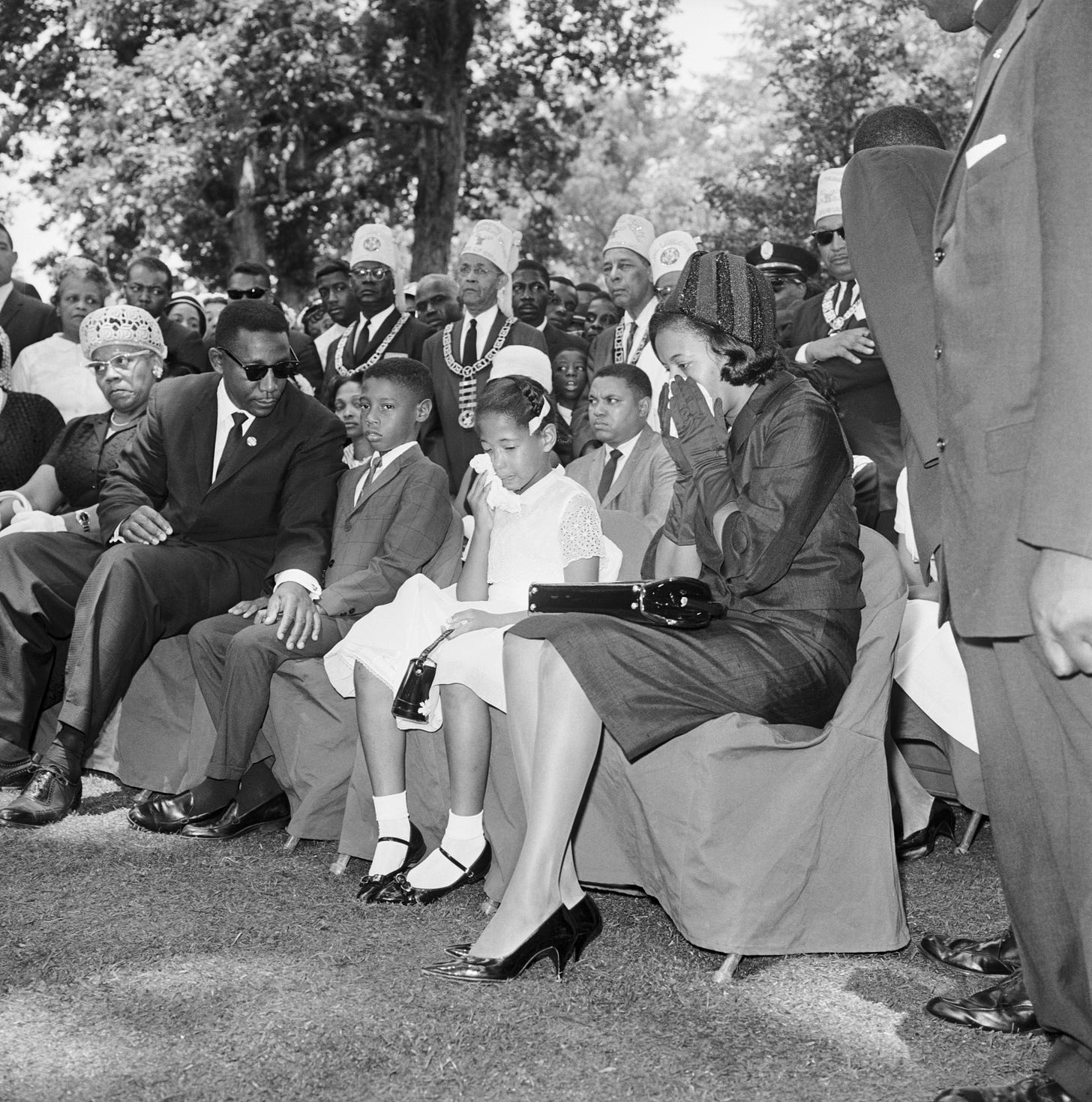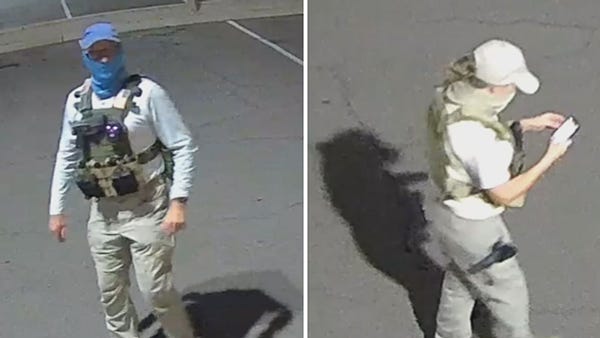The essential premise of a democratic system of government is that ultimately those who govern are beholden to the will of the governed.
Democracies do not automatically produce more noble or enlightened leaders than other forms of government. We are, after all, electing human beings, who are prone to the frailties, biases, and failings of our species. What democracy is supposed to offer is a corrective. When leaders fail to serve the needs of the populace, there is a mechanism for replacing them. It’s called elections.
This is why the attacks on voting rights by the Republican Party, the embrace of the Big Lie, and the intimidation of voters by armed vigilantes in places like Arizona ultimately put our entire system of governance at great risk. If the results of free and fair elections are denied, the will of the voters can be nullified. If citizens are prevented from voting — whether by fear or targeted administrative hurdles meant to disenfranchise — we will quickly arrive at a place where the remedial forces of elections will be replaced by stifling autocracy.
This is why what we are witnessing with threats and intimidation is so dangerous. We teeter on the edge of an abyss.
It is vital that we recognize the long historical antecedents of our present moment. Elections are not really about the will of the people; they are about the will of voters. And for much of our nation’s history, who could vote was greatly limited. There have long been violence and restrictions at the ballot box, even in fairly recent history.
Covering Jim Crow as a young reporter shaped me as a professional and as a citizen. It is why I am filled with disgust and anger at all those who will condone a return to the repressive mindset rooted in some of our darkest history.
What follows is an excerpt from our book What Unites Us.
When I joined CBS News in 1962, I got myself assigned to the civil rights beat. It was emerging as an important national story, and again I would like to say I wanted to cover it because I sensed the moral import of the moment. But it was more that I saw it as a great opportunity for a reporter eager to be a witness to history and to make a name for himself.
I headed to Jackson, Mississippi. As a reporter, I walked the streets, stepped into the cafés, and visited the churches to find out whom I should talk to, who mattered. I heard the obvious answers: The mayor. The local business leaders. And since it was the state capital, I sought out the legislators and others in government. But among the African Americans I met, particularly the pastors, one name kept coming up from the start: I needed to meet Mr. Evers. Medgar Evers.

By this point, Evers was in his late thirties and a veteran of the civil rights struggle, even if most of the country had not been paying close attention to him. Whereas Dr. Martin Luther King sought a broad mandate of social change on a variety of issues — including, of course, the right to vote — Evers was different. He was focused like a laser beam on voting.
I joined him one Election Day at a polling place on the outskirts of Jackson. Evers and a group of Black voters showed up with their papers. As they approached the white voting official at the door, some in the group seemed to tremble, understandably. Not Evers. I learned later that he had done this many times before.
What proceeded was a simple morality play, but one that shaped me at least as much as any other event in my lifetime. The voting official said, “What you doing here, boy?” And Evers politely responded that he had come with these fine people to vote. “You aren’t voting today, you aren’t voting any day,” came the reply. The words on the page cannot do any justice to the terror and violence in the voice. Evers explained that they had all their papers and were registered, knowing full well the response. “Well, I’m telling you,” the official answered, “they ain’t gonna vote.”
To write this now is to be shocked anew by my naïveté and blindness. I wish I had seen all of this earlier. But the brazenness of a white election official tossing aside the constitutional right of enfranchisement, a right that entered the Constitution only after the Civil War, our bloodiest conflict, made me seethe with anger. I was standing off to the side, watching this transpire. I don’t remember having a camera crew at the time. Those days we often traveled without one, as showing up with a camera was considered a provocative act by local officials. But I do remember sharing my experience later with my soundman, who was from Alabama.
“What did you expect to happen?” he asked.
“Not that,” I said.
“Well, that’s how it is a lot of places,” he said.
There was a disconnect back then between what was happening in the South and what the rest of the nation knew. Many people had no idea these kinds of things were taking place. Even some of my bosses back at CBS News headquarters in New York wondered how widespread and entrenched these types of actions were. Did this happen all the time, or was it a rare occurrence? Was it being staged? I knew what I was seeing, and I was determined to bring this story into living rooms across the nation. This was not America as I had envisioned it. And I wanted my countrymen and women to know this, too. I felt a great certainty in the separation of right from wrong. My relationship with my country would never be the same. Patriotism would require standing up to what I had seen, not standing alongside it in silence.
I witnessed in Medgar Evers that day the very definition of courage and love of country — his country, my country, our country. However, I had a sense from that first reporting trip that Evers was living on borrowed time. To stand up for the right to vote was to challenge all the power of the Southern status quo.
I was in Tuscaloosa, Alabama, in June of 1963 when we got the call, and it came from King’s headquarters. Evers had been shot and killed. My crew and I chartered a plane, getting to Jackson before daybreak and any other national reporters. Evers had been shot on his front porch, while his wife and children were at home, by a coward hiding in the grass across the street. It was a calculated and cold-blooded assassination. The murder scene was eerily quiet. There were some local law enforcement, and eventually other reporters showed up, but I don’t remember any large crowds.
As I reported from the city, I found that African Americans’ feelings ranged from outrage to despondency. This was what happened when someone tried to stand up and lead. But there was also a deep resolve to persist. Among white people, there were certainly a fair number who felt that Evers had gotten what he deserved. The majority just wanted to go about their lives as if nothing had happened. There might have been white people in Jackson who would have told me this was terrible, that we needed to get to the bottom of it, that we needed to change our ways. But if those people were there, I didn’t find them.
Evers’ wife, Myrlie Evers, would tell me later how terrified she was. She wasn’t only in shock and mourning the sudden death of her husband; she was frightened about what might happen to her children. I wish all those who so glibly try to suppress the vote today could be forced to go back in time and look into her eyes as I did that day in Jackson.

Note: If you are not already a subscriber to our Steady newsletter, please consider joining us. And we always appreciate you sharing our content with others and leaving your thoughts in the comments.





That Democrats aren't making a bigger deal of this is just astonishing to me. This is voter intimidation, plain and simple. How is this NOT the front page story everywhere right now?????
The only comment I have here, Mr. Rather, is to say a profound "thank you" for reporting your experiences with Mr. Evers. He was a true patriot, someone worthy of our highest admiration. As are you, sir.